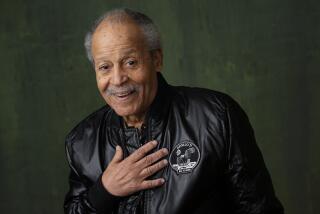1st Commander of International Space Station Retires From Navy
- Share via
SAN DIEGO — Capt. William Shepherd, the first commander of the international space station, retired Friday from the Navy, ending a 30-year career capped by 141 days in space.
Astronauts who succeeded Shepherd aboard space station Alpha called from orbit to wish their NASA colleague well during a retirement ceremony at the San Diego Aerospace Museum.
“Your impacts on this space station are everywhere,” Dominic Gorie said from 220 miles above the Earth.
Shepherd’s Navy career took him from running covert operations with the CIA against Soviet-backed revolutionaries in Latin America in the early 1980s to working hand in hand in space with Russian cosmonauts for 4 1/2 months. He returned to Earth on March 18.
“It’s a strange world,” he said. “I found that being with the Russians, maybe I had changed too.”
Shepherd, 52, remains on active duty with NASA.
As the first member of the elite Navy SEALs special operations unit to become an astronaut, he brought the space agency a much-needed fix-it-and-get-the-job-done approach.
“Shep definitely brings a different point of view,” said astronaut and Navy Capt. Ken Bowersox, who served as Shepherd’s backup during training.
More than once, Shepherd--known as “Mr. Garage Mechanic”--sent flight controllers into his garage at home to dig for tools he needed during his sojourn in space. He built a kitchen table out of space station scraps.
To the Navy, Shepherd was a source of pride, putting a public face on a special warfare branch that usually hides in the shadows.
“He was always a SEAL officer in a spacesuit,” said Rear Adm. Eric T. Olson, commander of the Naval Special Warfare Command. Olson credited Shepherd with shattering the stereotype of the SEAL as a “one-dimensional gunslinger.”
Shepherd, however, did his share of gunslinging. From 1981 to 1983, he was assigned to the CIA’s Directorate of Operations and did covert work in Latin America.
The agency requested a SEAL officer to help restore its unconventional warfare capabilities in the Reagan administration’s covert war against the Soviet-backed Sandinistas in Nicaragua.
Shepherd formed an attack force of high-speed powerboats confiscated from drug runners by the U.S. Customs Service in Florida, which he armed with machine guns and grenade launchers, said Duane R. Clarridge, who ran the CIA’s Latin American Division in the 1980s.
In 1983, the boats attacked Carinto, Nicaragua’s main port, and blew up fuel tanks that held the country’s oil reserves, forcing the evacuation of 25,000 people, he said at the retirement ceremony.
Shepherd said the highlight of his career was his time in space.
On his second day in orbit, he recalled gazing out the window at the vast snow fields of central Russia--not a road or a track for a thousand miles in any direction.
“So, I’m thinking to myself, looking at this white expanse, thinking why this shouldn’t be the surface of another planet,” he said. “I’ve thought about that a lot since I’ve been back.”
More to Read
Sign up for Essential California
The most important California stories and recommendations in your inbox every morning.
You may occasionally receive promotional content from the Los Angeles Times.













